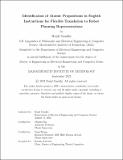Identification of Atomic Propositions in English Instructions for Flexible Translation to Robot Planning Representations
Author(s)
Gandhi, Rujul
DownloadThesis PDF (975.2Kb)
Advisor
Fan, Chuchu
Zhang, Yang
Terms of use
Metadata
Show full item recordAbstract
Creating human-interactive problem-solving robots involves interfacing natural-language instructions into formal representations. This formal representation should contain all the verifiable constituent units (ideally atomic propositions) which are present in the natural language instruction. However, the format and vocabulary of atomic propositions may vary substantially across formal representations and their application domains. Hence, extracting the correct atomic propositions from natural language has been a bottleneck in converting language to formal representations. In this thesis, we propose and implement a two-step method for identifying atomic propositions in a representation-agnostic way. Given an instruction in natural English, we first identify the spans of that instruction that may potentially be atomic propositions, and then carry out a finer-grained translation into the chosen formalization language. In evaluating this approach, we demonstrate the ability of the span identification method to generalize to two common domains of robot planning tasks, navigation and manipulation, as well as three additional domains of household robot tasks. Finally, we discuss, implement, and evaluate methods to incorporate span identification into the process of parsing English into three formal representations: Temporal Logic, PDDL, and a custom style of atomic propositions. Using pretrained language models and naturalistic parallel data, we build a system that enables flexible formalization of natural language across chosen intermediate representations.
Date issued
2023-09Department
Massachusetts Institute of Technology. Department of Electrical Engineering and Computer SciencePublisher
Massachusetts Institute of Technology